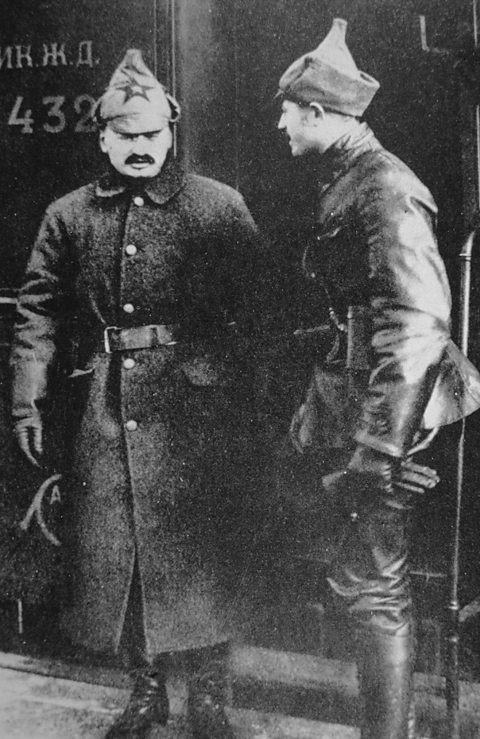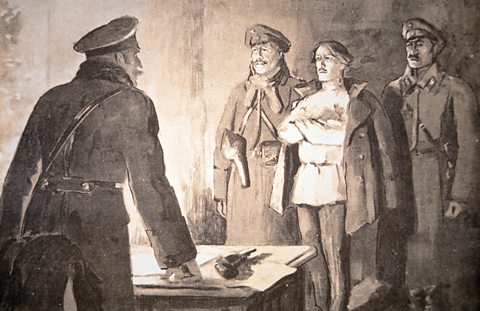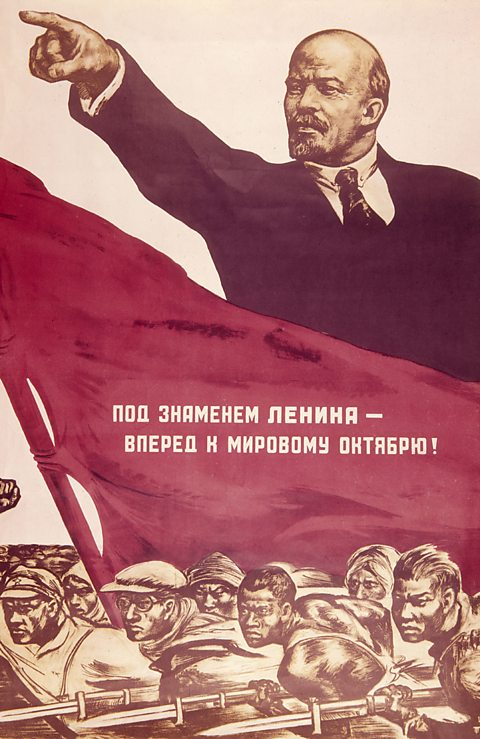Russian Civil War - The Red Army
After seizing control of Russia from the Provisional Government, the Bolsheviks had to safeguard their fragile grip on the reins of power.
Lenin negotiated peace with Germany and therefore an end to Russia's role in World War One. However he could not avoid a civil war.
The Russian Civil War raged from 1918 until the start of 1921. During this time, the Bolsheviks faced massive opposition to their rule in the form of the White Armies, led by former officers of the Tsarist state, and also from intervention by the forces of foreign countries. Yet, by the start of 1921, the Bolsheviks had defeated their enemies and gained a complete victory.
Leadership of the Reds
The Bolsheviks were extremely fortunate in the quality of their leadership, particularly in Lenin and Trotsky. Throughout the Civil War, Lenin provided the energy and drive needed to inspire success, while Trotsky provided the organisation and charisma.
Role of Leon Trotsky

Trotsky became Commissar for War in the Bolshevik government in March 1918. A brilliant organiser and improviser, Trotsky created the Red Army out of the Red Guards and from the remnants of the old Tsarist army.
- Appointing ex-Tsarist officers was questioned, but Trotsky insisted they would bring expertise essential to winning the Civil War.
- Political commissars were drafted into army units to spread socialist ideas and maintain loyalty to the Bolsheviks.
- Conscription was established, hundreds of thousands of peasants were drafted into the Red Army.
- Trotsky imposed tough discipline and control over the Red Army. Officers found guilty of cowardice or treachery were executed. However, men who showed initiative and courage were promoted rapidly.
Trotsky travelled in an armoured train to the front lines to encourage troops. At times of crisis, he readily assumed personal command of areas under threat. He successfully inspired and encouraged troops to greater efforts, and to eventual victory.
Ruthlessness
Under Lenin's leadership, the Bolsheviks displayed total ruthlessness in making sure that they did not face rebellion and revolt in the areas they controlled, assuming the role as the true nationalists and representative of Russian people.
- Once the Civil War began, the Bolsheviks banned all political parties and arrested their leaders. They also closed down newspapers that opposed them.
- "War communism" was introduced to help supply the war effort. In May 1918 a Food Dictatorship was established where the Bolsheviks requisitioned grain from the peasants.
- The Cheka, the Bolshevik Secret Police, hunted down and arrested anyone who was suspected of hostility towards the Bolsheviks. By the end of the Civil War, they had executed over 100,000 political opponents. This was known as the Red Terror.
- Russia’s industry was nationalised, giving the Bolsheviks total control of goods production.

Propaganda

The Bolsheviks organised a highly effective propaganda campaign dispersed through posters, leaflets, cinema and speeches.
Propanganda told the people that living conditions would improve and wealth would be distributed more fairly. In contrast they warned that the White Armies and their leaders would destroy all the achievements of the Revolution, break up the Soviets and bring back the old system.
The Bolsheviks portrayed themselves as a patriotic party who would defend Russia from imperialists. This was particularly effective since the Whites had support from Britain, France and the USA.
The Bolsheviks spread the fear that Russia would be taken over by foreign countries and absorbed into their empires.